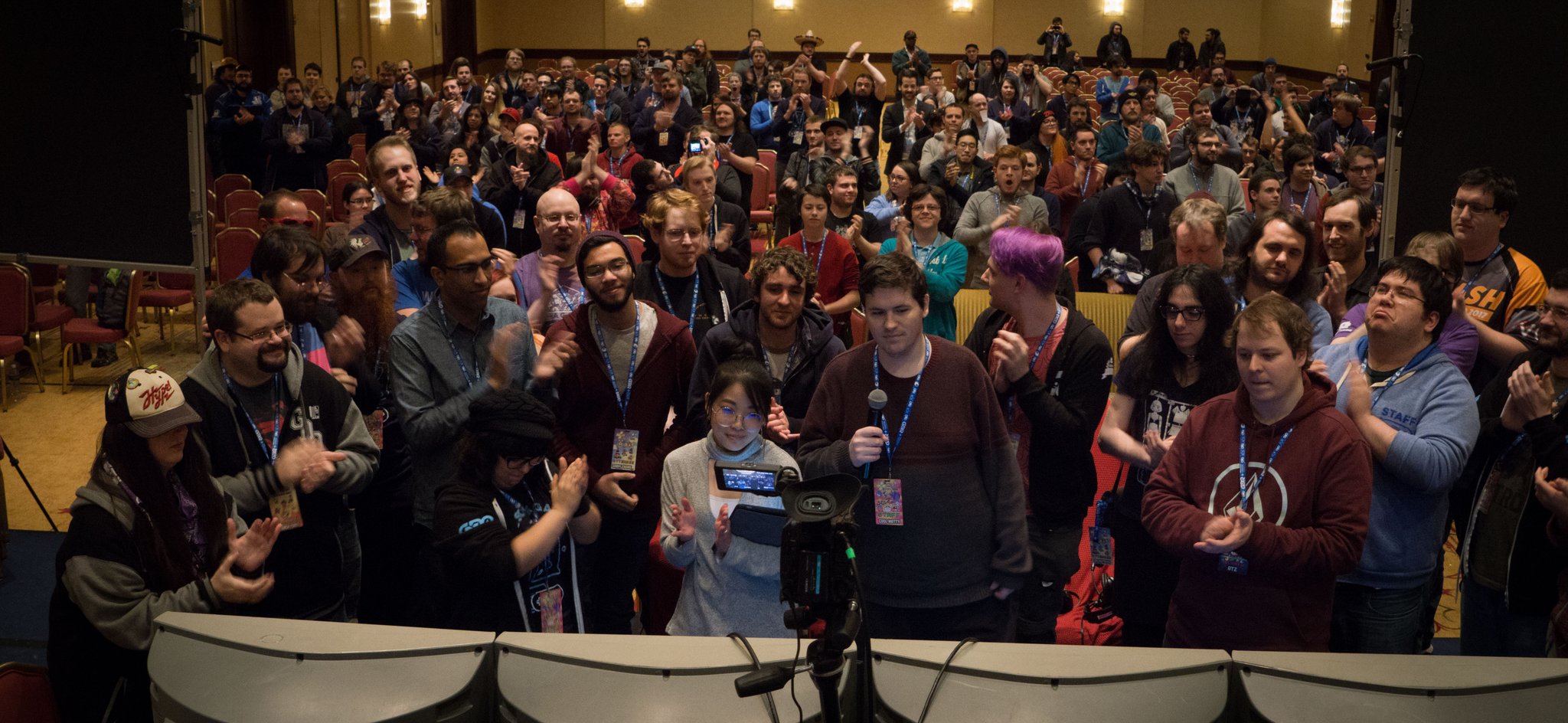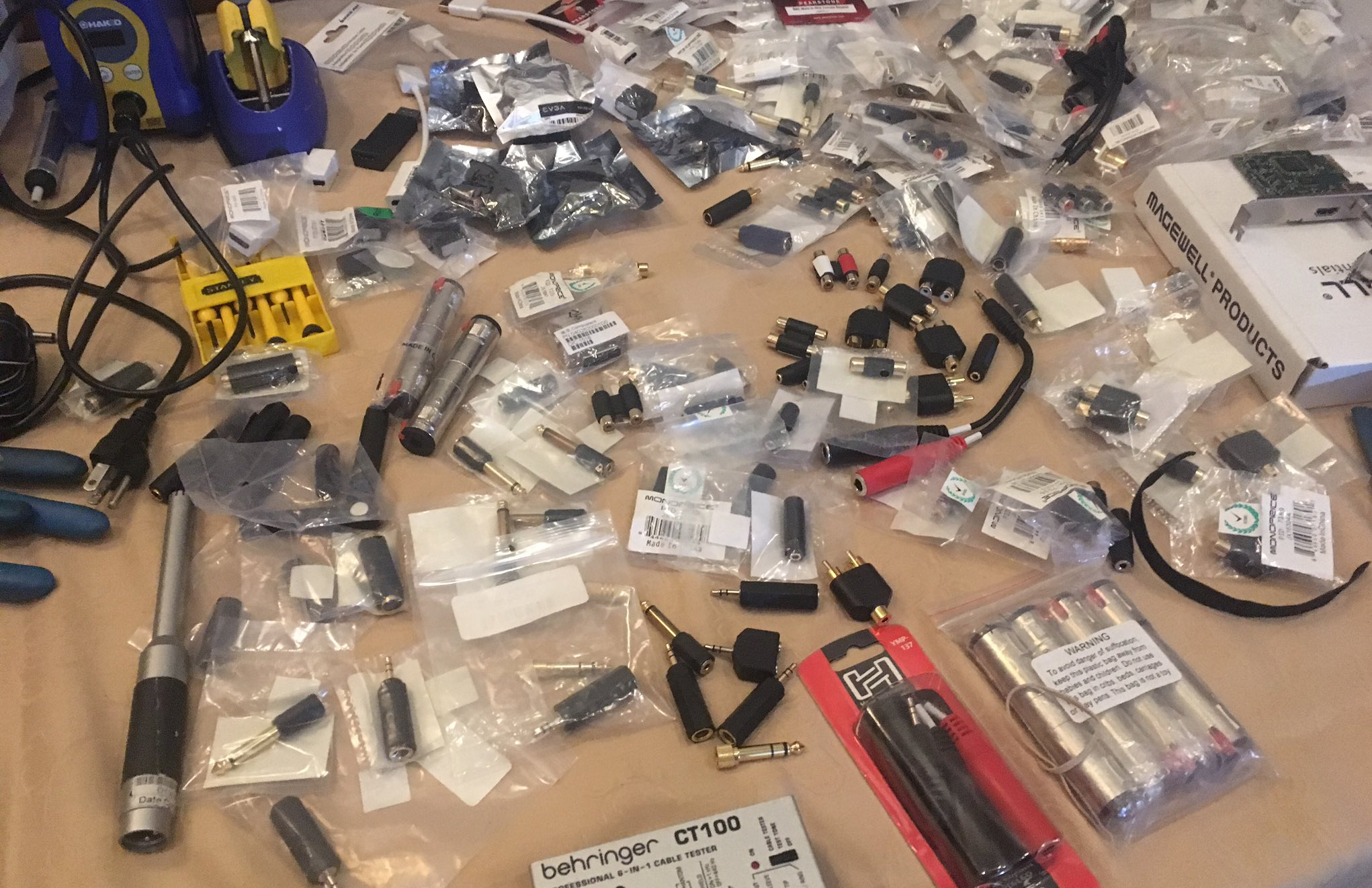How week-long, 24-hour livestream AGDQ comes together
Homebrew gear, eBay finds, and broken sleep schedules.

It's a marvel that Awesome Games Done Quick runs as smoothly as it does. The backstage area at the week-long speedrunning marathon—which doesn't stop for its entire duration—looks like a makeshift flight control room. Equipment racks covered with boxy electronics and every adapter ever conceived border rows of tables stacked with mixers and monitors, where workers screen donation messages, adjust video and audio, make announcements, interview runners, and somehow stream for over 160 hours with remarkably few serious hitches.
The 24-hour marathon is an odd feature of gaming culture, once done just for the hell of it, such as at summer LAN parties, now often mixed with the spirit of a PBS pledge drive to raise money for charity—as with AGDQ and Extra Life. "[24-hour marathons were] just what the speed gamers did, and we just copied that and never put too much thought into it," says Games Done Quick founder Mike Uyama about the origin of Games Done Quick, which began in his mother's basement and now takes over hotels. The logistics came second.
Sleeping on the job
Marathons take a physical toll on participants—sometimes a dangerous one—though unlike other streams, AGDQ isn't about testing individual stamina. No one is expected to stay up for 24-hours straight at any given time, as the technical staff staggers their shifts (though "it doesn't always work"), and the runners themselves only need to be on their marks for their particular session.
Still, living in a hotel for a week and working at odd hours is more than just uncomfortable. Tech coordinator Aharon Turpie's particular challenge is finding kosher food within the confines of an airport hotel and its surrounding FedEx shipping centers, holding companies, and public storage lots—at last check when we spoke, he'd found a bagel.
It's late night at #AGDQ2018, but that doesn't mean everyone is sleeping! Plenty of gaming and fun going on in the practice and casual rooms! pic.twitter.com/V1B0TZxi1BJanuary 9, 2018
Sleep happens when and where it needs to.
And restful sleep is not guaranteed. Though AGDQ 2018 was relatively uneventful according to the accounts I heard, both Turpie and special events producer Alex Van Camp recall being woken up in the middle of the night during previous events to fix technical problems. The night before I spoke to Turpie and Van Camp, someone slept behind the scenes to be ready to set up a three-way Zelda NES race—sleep happens when and where it needs to.
As for the attendees, it's up to them to determine which runs to be awake for, and how many to catch in any given 24-hour period—though many also volunteer to help at some point. During this year's Bloodborne run, I saw a man sleeping in his chair near the back of the theater, as well as a pair of attendees shuffling down from their room mid-afternoon, one performing a smell check on the other to assess their presentability. This was six days into the event, just before the final stretch which wouldn't end until after 4 am Sunday morning, nearly seven full days after it started.
Homebrew and eBay gear
Both our video matrices, like our 8-way HDMI matrix, I think we got for about $1,000 on eBay … It's this weird off-brand. It has no model number.
Aharon Turpie
One attendee I spoke to said he couldn't stay up for the 4 am finale, because he had to drive to Michigan and go straight back to work on Monday, and it isn't much different for the organizers. There's little time for the full and part-time staff to celebrate when it's over: the set needs to be broken down quickly, and the equipment stored, and then it's back home to get on with regular life.
The biggest gaming news, reviews and hardware deals
Keep up to date with the most important stories and the best deals, as picked by the PC Gamer team.
As you'd expect, there's a ton (possibly literally) of equipment: more CRT TVs than I've seen in the same room in a long time, computers, consoles, and all the AV equipment needed to rapidly transition from streaming Gargoyles on the Genesis to Castlevania: Harmony of Dissonance on the GBA with just 10 to 20 minutes of setup time scheduled between games.
"We use RGB for the capture, and then OSSCs [Open Source Scan Converters] to convert that into HDMI," says Uyama. "That's basically how it works, so that we can use one capture card with four HDMI inputs to capture everything so we don't have to constantly switch out cables for the runs, we just have to switch out cables per console."
Some of big equipment used at AGDQ isn't exactly top-tier, but what's important is that it works. "A lot of expensive stuff that's in the rack is off eBay," says Turpie. "Both our video matrices, like our 8-way HDMI matrix, I think we got for about $1,000 on eBay … It's this weird off-brand. It has no model number."

Aside from wrangling the stacks of off-brand equipment, Turpie also helps out with some homebrew solutions. "One of them is a mute button so the host can mute themselves so they can talk to people around them, ask questions," he says. "We bought a foot pedal, like a standard audio foot pedal mute button, and the cheapest thing you can find is like 50 or 100 dollars, and it was garbage, it didn't work. You pushed a button, and it did not mute, it only added static. So what I did is I made an Arduino, and it communicated with our mixer over Ethernet—it was like a digital mute now. And that worked."
Turpie's ultimate dream is to build two streaming sets so that one run can be prepared while another is underway, but he and Uyama laugh when he brings it up—it isn't feasible, Turpie says, due to the amount of space and the budget it would require. "The audio needs to mix with everything, and our mixer is maxed out, so we need a mixer that is twice as big and that goes from having a mixer that's like $3,000 to something that's at least $10,000. We can dream."
The future of GDQ
...We will definitely physically expand.
Mike Uyama
Games Done Quick is growing, so maybe Turpie's dream can happen someday, even if it's a fantasy for now. Last week's AGDQ, which raised over two million dollars in support of the Prevent Cancer Foundation, was the last to be held at the Hilton Washington Dulles Airport Hotel. They need more space.
"If I remember correctly, the registrations for this event filled up in less than 24 hours," says Uyama. "So we will definitely physically expand."
Adding panels to the mix is a possibility, though Games Done Quick is not poised to become a mini-PAX and abandon its founding purpose, says Uyama. "As to how much and how fast [we expand], it's basically as much as we're comfortable with and as much as we can sustain, because the big difference between us and a normal convention is the stream, and the speedruns, and the fundraising is our focus."
Great crowd showing their courage during the Horror Block! pic.twitter.com/iUo28dl1BRJanuary 10, 2018
Between Uyama, who says he's on his way to returning to full-time work on GDQ after stepping back due to a medical condition, director of operations Matt Merkle, and the other organizers, there's a long to-do list before anyone sits on the livestream couch and donations start rolling in: taking submissions from runners ("a very lengthy process"), finding a venue, planning room layouts, organizing volunteers and staff, and of course setting up the mass of machines and cables that streams it all to Twitch.
With all that to do, and expansion in the works, the organizers give themselves little time between events. The next one, Summer Games Done Quick, is set to start June 24 in Bloomington, MN, leaving under six months to finish bringing it together now that AGDQ has ended.
I'm doubtful that any stream of AGDQ's duration and complexity could go off without a single problem—consider that the Oscars managed to incorrectly announce the award for Best Picture last year—so while each event draws complaints and criticism, that it has run without disaster is impressive. May the Arduino mute button and every pile of adapters, mile of cabling, and off-brand AV device stay strong and operational to stream another day.

Tyler grew up in Silicon Valley during the '80s and '90s, playing games like Zork and Arkanoid on early PCs. He was later captivated by Myst, SimCity, Civilization, Command & Conquer, all the shooters they call "boomer shooters" now, and PS1 classic Bushido Blade (that's right: he had Bleem!). Tyler joined PC Gamer in 2011, and today he's focused on the site's news coverage. His hobbies include amateur boxing and adding to his 1,200-plus hours in Rocket League.

